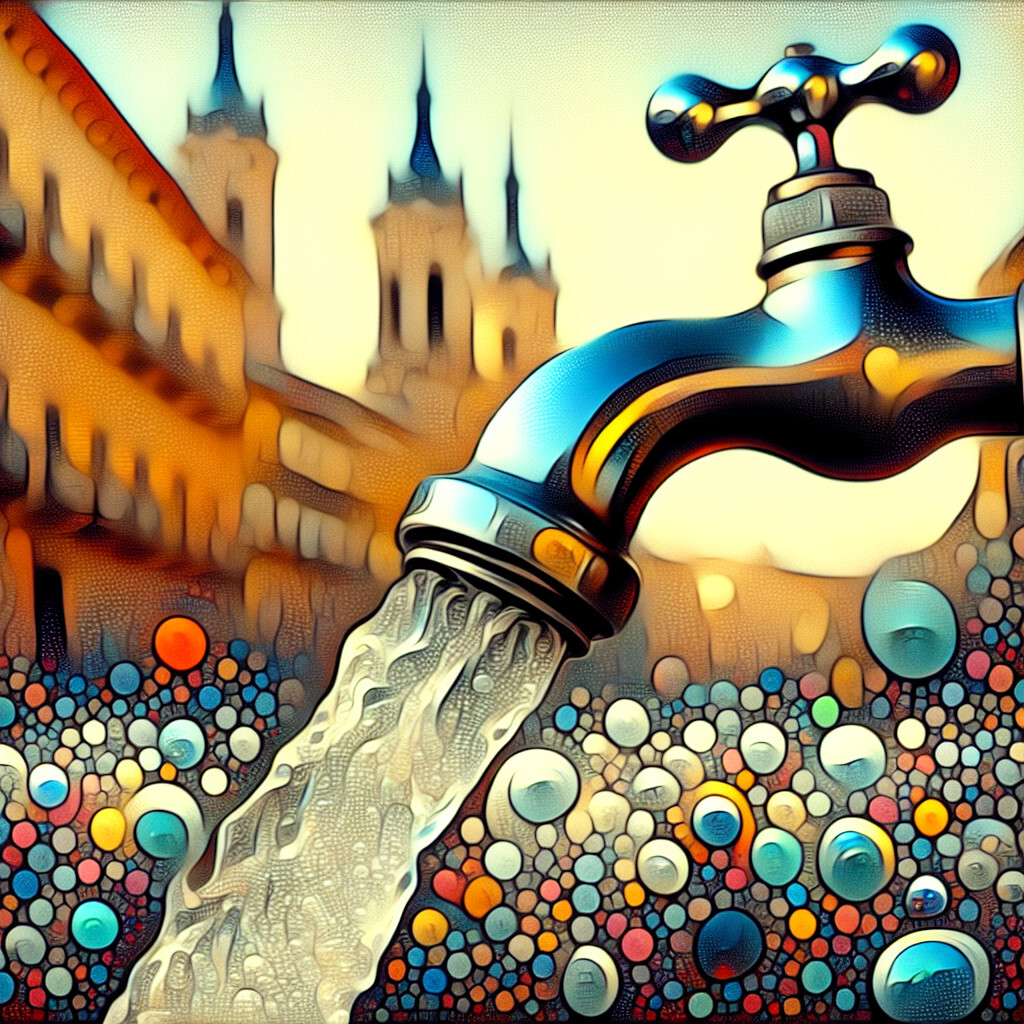-
Table of Contents
“Zaragoza Tap Water: Pure, Refreshing, and Sustainable”
Introduction

Tap water in Zaragoza, a city in Spain, is sourced from the Ebro River. The water undergoes a rigorous treatment process to ensure it is safe for consumption. Despite this, many locals and tourists prefer bottled water due to the hard nature of the tap water, which can have a distinct taste due to the high mineral content. The city’s water supply system is managed by the Zaragoza Water Commission, ensuring the provision of water services to all residents.
Understanding the Quality of Tap Water in Zaragoza
Zaragoza, a city known for its rich history and vibrant culture, is also recognized for its commitment to providing its residents with high-quality tap water. The city’s water supply system is a testament to its dedication to public health and environmental sustainability. However, understanding the quality of tap water in Zaragoza requires a comprehensive look at the city’s water management practices, the sources of its water, and the processes involved in treating and distributing it.
Zaragoza’s tap water primarily originates from the Ebro River, which is one of the most significant rivers in Spain. The city’s water supply system also draws from underground wells to supplement the river water, especially during periods of low rainfall. This combination of surface and groundwater sources ensures a steady supply of water to the city’s residents.
The quality of Zaragoza’s tap water is maintained through rigorous treatment processes. The water undergoes several stages of treatment, including coagulation, sedimentation, filtration, and disinfection. These processes effectively remove impurities such as bacteria, viruses, algae, fungi, minerals, and man-made pollutants that may be present in the water. The result is clean, safe, and potable water that meets or exceeds the standards set by the World Health Organization and the European Union.
In addition to these treatment processes, Zaragoza’s water supply system also includes a robust monitoring and testing regime. The city’s water quality laboratory conducts regular tests on samples collected from various points in the water supply network. These tests check for a range of parameters, including pH, turbidity, hardness, and the presence of specific contaminants. The results of these tests are made publicly available, providing transparency and reassurance about the quality of the city’s tap water.
Despite the high quality of Zaragoza’s tap water, some residents may notice a slight taste or odor. This is typically due to the presence of minerals such as calcium and magnesium, which are naturally occurring in the Ebro River and the city’s groundwater sources. These minerals are not harmful to health, and in fact, they contribute to the nutritional value of the water. However, they can affect the water’s taste and odor, especially when the water is heated. Using a water filter or letting the water stand for a few hours can help to reduce these effects.
It’s also worth noting that the quality of tap water can vary slightly from one part of the city to another. This is due to factors such as the age and condition of the water supply infrastructure, and the distance of a location from the water treatment plant. However, these variations are generally minor and do not affect the overall safety or potability of the water.
In conclusion, Zaragoza’s tap water is of high quality and safe to drink. The city’s water management practices, combined with its rigorous treatment processes and regular testing, ensure that the water meets stringent health and safety standards. While the taste or odor of the water may vary slightly, this does not detract from its quality or safety. Whether you’re a resident of Zaragoza or a visitor to the city, you can feel confident about drinking the tap water.
The Role of Zaragoza’s Infrastructure in Providing Clean Tap Water
Zaragoza, a city located in the northeastern part of Spain, is renowned for its rich history, vibrant culture, and most notably, its clean tap water. The city’s infrastructure plays a pivotal role in ensuring the provision of clean and safe tap water to its residents. This article aims to shed light on the intricate processes and systems that make this possible.
Zaragoza’s water supply primarily comes from the Ebro River, the longest river in Spain. The city’s water infrastructure is designed to harness this abundant resource effectively. The water from the river is first collected and then subjected to a rigorous purification process before it is deemed safe for consumption. This process involves several stages, including coagulation, sedimentation, filtration, and disinfection, each of which contributes to the removal of impurities and potential contaminants.
The city’s water treatment plants play a crucial role in this process. Equipped with state-of-the-art technology, these facilities ensure that the water meets the stringent quality standards set by the European Union. The water is continuously monitored and tested for various parameters, including pH, turbidity, and microbial content, to ensure its safety and quality.
Once the water is treated, it is transported through an extensive network of pipes to reach the households in Zaragoza. The city’s water distribution system is a marvel of engineering, designed to deliver water efficiently and reliably. The system is regularly maintained and upgraded to prevent leaks and ensure the uninterrupted supply of water.
Moreover, Zaragoza’s commitment to providing clean tap water extends beyond its treatment and distribution systems. The city has implemented a comprehensive water management strategy that focuses on sustainable use and conservation of water resources. This includes measures to reduce water wastage, promote water recycling, and encourage the use of rainwater for non-potable purposes.
The city’s efforts in this regard have been recognized internationally. In 2008, Zaragoza was named the ‘Water Saving City’ by the European Commission for its innovative water management practices. The city’s water infrastructure also played a key role in its successful hosting of the International Exposition dedicated to water and sustainable development in the same year.
However, the provision of clean tap water in Zaragoza is not without its challenges. The city faces issues related to aging infrastructure, climate change, and increasing demand for water. To address these challenges, the city is investing in infrastructure upgrades, implementing climate-resilient water management strategies, and promoting water conservation among its residents.
In conclusion, Zaragoza’s infrastructure plays a vital role in providing clean tap water to its residents. From the collection and treatment of water to its distribution and management, every aspect of the city’s water infrastructure contributes to this endeavor. Despite the challenges, Zaragoza continues to strive towards ensuring the provision of safe and clean tap water, demonstrating its commitment to the health and well-being of its residents.
Health Implications of Drinking Tap Water in Zaragoza
In the bustling city of Zaragoza, Spain, the question of the health implications of drinking tap water is a topic of considerable interest. As the fifth largest city in Spain, Zaragoza’s water supply is a critical issue that affects the health and well-being of its residents. The quality of tap water can vary greatly from one location to another, and Zaragoza is no exception. This article aims to shed light on the health implications of drinking tap water in Zaragoza.
Zaragoza’s tap water is sourced from the Ebro River, which is one of the most significant rivers in Spain. The water undergoes a rigorous treatment process before it reaches the taps of Zaragoza’s residents. This process includes filtration, disinfection, and chemical treatment to remove harmful substances and ensure the water is safe for consumption. However, despite these measures, there are still potential health implications associated with drinking tap water in Zaragoza.
One of the primary concerns is the hardness of the water. Zaragoza’s tap water is known for being particularly hard due to high levels of calcium and magnesium. While these minerals are not harmful to health in moderate amounts, excessive consumption can lead to health issues such as kidney stones. Moreover, hard water can also have a negative impact on the skin, causing dryness and irritation.
Another concern is the presence of chlorine in the tap water. Chlorine is commonly used in water treatment to kill bacteria and other microorganisms. However, it can react with organic matter in the water to form by-products known as trihalomethanes (THMs), which have been linked to an increased risk of cancer. While the levels of THMs in Zaragoza’s tap water are within the legal limits set by the European Union, long-term exposure could still pose a potential health risk.
Furthermore, traces of pesticides and other agricultural pollutants have been detected in Zaragoza’s tap water. These substances can enter the water supply through runoff from agricultural fields and can have harmful effects on health, including hormonal disruption and an increased risk of certain types of cancer.
Despite these potential health implications, it’s important to note that Zaragoza’s tap water is generally considered safe to drink. The city’s water treatment facilities adhere to strict standards set by the European Union to ensure the water’s safety. Regular testing is conducted to monitor the levels of various contaminants, and the results are publicly available for transparency.
However, for those who are concerned about the potential health risks, there are several steps that can be taken. Using a water filter can help to remove many of the contaminants found in tap water, including chlorine and pesticides. Alternatively, bottled water is widely available in Zaragoza, although this option has environmental implications due to the production and disposal of plastic bottles.
In conclusion, while there are potential health implications associated with drinking tap water in Zaragoza, the water is generally safe for consumption. The city’s water treatment processes are designed to ensure the safety of the water supply, and regular testing is conducted to monitor the levels of contaminants. However, for those with specific health concerns, using a water filter or opting for bottled water may be advisable.
Sustainability and the Future of Tap Water in Zaragoza
Zaragoza, a city in northeastern Spain, is renowned for its rich history, vibrant culture, and stunning architecture. However, it is also gaining recognition for its commitment to sustainability, particularly in the realm of water management. The city’s approach to tap water is a testament to this commitment, offering valuable insights into the future of sustainable water practices.
Zaragoza’s tap water is sourced from the Ebro River, Spain’s most voluminous river. The water undergoes rigorous treatment processes to ensure it meets the highest standards of quality and safety. These processes include coagulation, sedimentation, filtration, and disinfection, which effectively remove impurities and pathogens. The result is clean, safe, and refreshing tap water that residents can consume without concern.
However, the city’s commitment to sustainability extends beyond providing safe tap water. Zaragoza is also focused on conserving water resources and reducing water waste. The city has implemented various measures to achieve these goals, such as promoting water-efficient appliances and fixtures, encouraging water-saving habits among residents, and investing in infrastructure to minimize water leakage.
One of the city’s most notable initiatives is the Zaragoza Water Saving City project. Launched in 1997, this project aims to reduce per capita water consumption by promoting water-saving habits and technologies. Through this project, Zaragoza has managed to significantly decrease its water consumption, demonstrating that it is possible to maintain a high quality of life while using less water.
Moreover, Zaragoza is also exploring innovative ways to further enhance the sustainability of its tap water. For instance, the city is considering the use of renewable energy sources, such as solar and wind power, to operate its water treatment plants. This would not only reduce the city’s carbon footprint but also make its water supply more resilient to potential disruptions caused by climate change.
Furthermore, Zaragoza is investing in research and development to improve its water treatment processes. The city is particularly interested in advanced treatment methods that can remove emerging contaminants, such as pharmaceutical residues and microplastics. By staying at the forefront of water treatment technology, Zaragoza aims to ensure that its tap water remains safe and sustainable in the face of evolving challenges.
In conclusion, Zaragoza’s approach to tap water exemplifies how cities can balance the need for clean, safe water with the imperative of sustainability. Through its rigorous water treatment processes, water conservation measures, and forward-thinking initiatives, Zaragoza is not only securing its water future but also setting a benchmark for other cities around the world. As we grapple with the growing challenges of water scarcity and climate change, Zaragoza’s example offers a beacon of hope and a roadmap for sustainable water management.
Q&A
1. Question: What is the quality of tap water in Zaragoza?
Answer: The tap water in Zaragoza, Spain is of high quality and safe to drink, meeting all the European standards for water quality.
2. Question: Is the tap water in Zaragoza hard or soft?
Answer: The tap water in Zaragoza is considered hard due to the high mineral content, particularly calcium and magnesium.
3. Question: What minerals are found in Zaragoza’s tap water?
Answer: The tap water in Zaragoza contains minerals like calcium, magnesium, potassium, and sodium.
4. Question: Is it necessary to filter tap water in Zaragoza?
Answer: It is not necessary to filter tap water in Zaragoza for safety reasons as it meets the European standards for water quality. However, some people may choose to filter it to improve the taste or reduce the hardness.
Conclusion
After thorough research, it can be concluded that Zaragoza’s tap water is generally safe to drink. It meets the health and safety standards set by the European Union. However, due to its hardness and mineral content, some people may find the taste not to their liking. Therefore, while it’s safe for consumption, some residents and visitors may prefer to use a water filter or consume bottled water.






